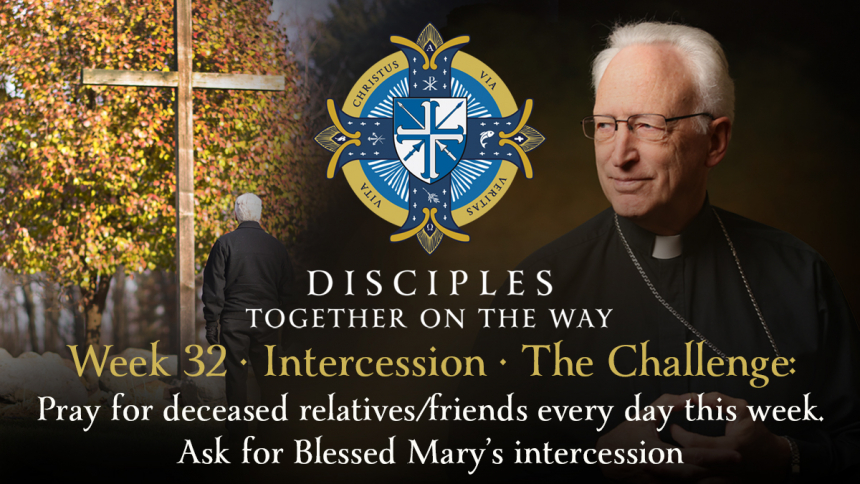
August 12, 2022
Dear brothers and sisters in Christ,
Welcome to this week’s Disciples Together on the Way challenge. Today we continue to delve deeper into the practice of intercession. That’s the act of praying for those around us. So far, we have prayed for those we love and those we struggle to love. This week, I’d like to look at intercessory prayers for the dead.
The act of praying for the dead is first glimpsed in the Old Testament when Judas Maccabeus prayed for the souls of his dead soldiers upon discovering the good and holy men died while wearing pagan amulets. Second Maccabees states "they prayed that the sinful deed might be fully blotted out… He [Judas Maccabeus] then took up a collection among all the soldiers, amounting to two thousand silver drachmas, which he sent to Jerusalem to provide for an expiatory sacrifice. In doing this he acted in a very excellent and noble way, inasmuch as he had the resurrection in mind … Thus, he made atonement for the dead that they might be freed from their sin" (2 Maccabees 12: 42-43, 46).
Judas Maccabeus led his companions through both prayer and alms requesting God deliver the soldiers from their sin and lead them to eternal light. As with the old covenant and the old Israel, so with the new covenant and the new Israel which is the Catholic Church. This tradition continues unto today. We are still asked to pray for the dead. Why? Because through these prayers, we can help relieve the holy souls in Purgatory. That is, those who have died in a state of grace but are not yet sufficiently purged of their sins and their effects so as to enter the beatific vision that is heaven.
The 16th century Council of Trent explains “that purgatory exists, and that the souls detained therein are helped by the suffrages of the faithful, but especially by the acceptable sacrifice of the altar”. We can intercede for our deceased relatives and friends through private prayer, offering Holy Mass in the deceased's name, or giving alms or other works of penance for their deliverance from purgatory.
This allows us on earth to participate more fully in the communion of the Church that exists on earth, in purgatory and in heaven. Just as we in life are not isolated but live in a community, so too we are not called to be isolated in death. Instead, we pray with the Blessed Virgin Mary and all the saints for the souls of our dearly departed as part of a community of believers.
The Second Vatican Council’s Dogmatic Constitution of the Church, Lumen Gentium, reminds us that "the Church has always believed that the apostles and Christ's martyrs [...] are closely joined with us in Christ, and she has always venerated them with special devotion, together with the Blessed Virgin Mary and the holy angels. The Church has piously implored the aid of their intercession."
Therefore, our challenge this week is to pray for deceased friends and relatives each day and especially to implore the intercession of Mary as our Mother. In particular, let us bring these loved ones to our Mass this week and join them to Christ’s offering in the Eucharist. Remember that our prayers are exceedingly powerful and comfort the souls of our loved ones along their path to eternal life and peace.
If you are unsure of where to start, the Church, in her wisdom, provides us with a beautiful prayer for the dead. I encourage you to pray this prayer or another from your heart, along with an Our Father, Hail Mary, and Glory Be for our beloved dead.
“Into your hands, O Lord, we humbly entrust our brothers and sisters. In this life you embraced them with your tender love; deliver them now from every evil and bid them eternal rest. The old order has passed away: welcome them into paradise, where there will be no sorrow, no weeping or pain, but fullness of peace and joy with your Son and the Holy Spirit forever and ever. Amen.”
And may God bless you in the name of the Father, of the Son, and of the Holy Spirit. Amen.
Yours in Christ,
+ Earl Boyea
Bishop of Lansing
